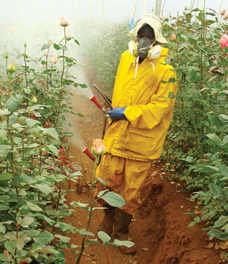 Agriculture in the whirlpool of large and niche market
Agriculture in the whirlpool of large and niche market
The Agriculture Industry, which is the backbone of our economy, is facing multiple threats from the growth of fake pesticides. According to a latest study conducted, the fake pesticides industry in India was estimated at billions of US dollars globaly, which account for 25 per cent by value and 30 per cent by volume of the domestic pesticides industry . The Study indicates that this market is expected to grow at the rate of 20 per cent per annum in terms of value, and if not addressed, can reach to approximately 40 per cent share by value in the pesticides industry by 2019. The problem is extreme in many countries including Kenya. Consequences of Counterfeit pesticides: The Contribution of agriculture sector in the GDP is already declining. This trend is worrying and will create a natural stretch on the agriculture sector in the future.The growth of spurious is adding fuel to the fire as Kenya has suffered a loss of tons of food grain production. In light of this, Kenya’s position as food sufficient country and exporter in the world is also at stake. There is no denying that the damage through such products is multi-fold and the counterfeit pesticides pose a significant threat to various stakeholders
Category: Featured Past Articles
Avocado is an important commercial fruit grown mainly by both small and large scale farmers. The main avocado varieties grown for export market are Hass and Fuertes. In addition, three others are traded in the local market which includes Puebla, Duke, and G6.
“Exemplary great and growing fast!!” That was the clear answer from a Kenyan grower, when I went calling to understand the avocado market. “Global avocado consumption is growing by about three percent every year; however, production growth remains a little behind. Worldwide investments in the product are on the rise but cannot match the demand. For now, the market is big enough for all players involved”, he added.
When the Investor had engaged a consultant two years ago to understand the market which led him to the bank to apply for a loan, he wasn’t sure whether he will get his money back. He had no experience as a grower, he had just been retrenched as a civil servant and wanted to try his luck. The consultant was crystal clear to him. “If you do not know how the global sector operates you cannot get far with the investment. You need to understand the seasons and the market dimensions”, he told me as we toured his expansive farm. “Worldwide, investments in avocado are on the rise. However, consumption is growing rapidly especially in North America and Europe. Europe is recording high prices due to low supply but in America, prices remain at a reasonable level while China is a major import market”, he added.
By Robert Wachira
 Towards the end of the 19th Century, a major breakthough in fungal control of diseases was accidentally discovered in Bordeaux region, France. To wade of passersby from eating his grapes that were along the road, a farmer used a mixture of CuSO4 and lime. This made the sprayed grapes look unpalatable to the passersby. However, to his amazement this grapes were not hit by downey mildew that struck the rest of unsprayed vines that season.
Towards the end of the 19th Century, a major breakthough in fungal control of diseases was accidentally discovered in Bordeaux region, France. To wade of passersby from eating his grapes that were along the road, a farmer used a mixture of CuSO4 and lime. This made the sprayed grapes look unpalatable to the passersby. However, to his amazement this grapes were not hit by downey mildew that struck the rest of unsprayed vines that season.
This was the beginning to of a game changer in disease control in what was then to be called Millardet-David treatment. Flash forward, to this day, copper is still being used by farmers across the world to control a wide spectrum of fungal infections and bactreria. Since the Bordeaux Mixture, many other copper formulations have been developed and released for disease control all over the world. Be that as it may, this has not left us without a fair share of problems.
Steering the flower umbrella body towards creating a lasting Kenya brand that competes as a first class product across the world; maintain the current markets, and make noticeable inroads into selected emerging markets.
 Briefly discuss Mr. Clement Tulezi (Background and Professional life to your current position)
Briefly discuss Mr. Clement Tulezi (Background and Professional life to your current position)
My professional background involves a large amount time as a communication and marketing expert, with experience spanning over 23 years in the main stream media, advertising, gender, social welfare, governance, entrepreneurship and conflict resolutions. I also have masters in project Management and I am a certified international mediator. I have worked in a number of trade associations, nonprofit making institutions and later the United Nations, where I was plucked into the flower industry.
Within those roles, I learned a lot about strategic thinking and the value of establishing a very clear focus and working with teams to achieve unique and timely corporate results. It entails everybody essentially rowing in the same direction and appropriately applying the resources within the organisation to meet the shared goal.
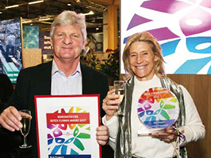 Nini Flowers from Kenya was rewarded with the Dutch Flower Group Award last week. Owner Billy Coulson is very proud and feels honoured. ”We didn’t think we would win. We’ve got a strong relationship with DFG, but we didn’t realise we were already in that league. I’m very proud of our team.”
Nini Flowers from Kenya was rewarded with the Dutch Flower Group Award last week. Owner Billy Coulson is very proud and feels honoured. ”We didn’t think we would win. We’ve got a strong relationship with DFG, but we didn’t realise we were already in that league. I’m very proud of our team.”
What does the DFG Award mean to you?
”It’s a very prestigious award. We really appreciate our relationship with DFG. We’ve been their customer for six years now. Our connection goes back to 2011, when DFG and Mavuno entered into a strategic alliance. The award is the result of six years of collaborating. We were really surprised, but very proud. We didn’t think we would win. We’ve got a strong relationship with DFG, but we didn’t realise we were already in that league, if you know what I mean. I’m very proud of our team, too.”
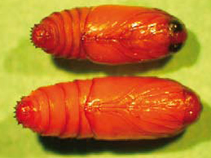 The False Codling Moth (Thaumatotibia leucotreta or FCM) is a threat to many of our flowers fruits, vegetables and other crops. Increased international trade and tourism has increased the risk of introduction of this pest. False Codling Moth can survive in climates described as tropical, dry or temperate. It is estimated that approximately 50 percent of the global environment may be suitable habitat for FCM.
The False Codling Moth (Thaumatotibia leucotreta or FCM) is a threat to many of our flowers fruits, vegetables and other crops. Increased international trade and tourism has increased the risk of introduction of this pest. False Codling Moth can survive in climates described as tropical, dry or temperate. It is estimated that approximately 50 percent of the global environment may be suitable habitat for FCM.
What is it
False codling moth is native to Ethiopia and sub-Saharan Africa. It is not known to be established in many parts of the world. Main routes of introduction are larvae on fruits, pods, or flowers. There are more than 70 potential hosts. The time for development is highly temperature defendant with up to five generations per year.
A female moth can lay up to 400 flattened-oval, pin-head sized eggs, usually placed singly. Young caterpillars are yellowishwhite with dark spots. Larvae can grow to be 1/2 inch in length and are bright red or pink with a yellow-brown head. On citrus, young larvae mine into the fruit, causing premature ripening.
You need to know how much water your irrigation system delivers in a given amount of time.
Automating irrigation based on plant needs is an option that can save a tremendous amount of water.
Water issues are a major concern around the world. Population growth and increased urbanization put increasing pressure on water supplies, making it increasingly important to use water more efficiently.
Addressing the challenges of using the right SFK during packaging and transit of flowers, would improve the quality and shelf life of flowers. SFK plays a crucial role in maintaining the quality flowers, but to get the maximum benefit, it must be the right quality and well used.
Silpack Industries Ltd, a national brand known all over the flower the flower growing areas for its innovative, durable, reliable and efficient packaging products and services has introduced yet another first in its SFK line. The super white SFK now undergoing trials with a number of growers may be the answer to numerous challenges faced by growers exporting to the direct market. The white Kraft made of 175gsm can withstand 10 hrs within the first 12 hrs, 9 hrs in 3 days and 7 hrs in 5 days. This is a characteristic which no other SFK can provide.
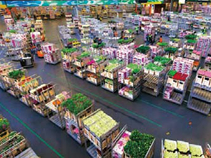 Consumer behaviour is always changing. Sometimes buyers want a good quality plant or bunch of flowers for a low price. At other times they want something very special and purchase price is not an issue. Millennials are driving further growth in online sales. Babyboomers are set to retire and are expected to increase their expenditure on flowers and plants. In the next decade, Rabobank is expecting a 2% growth per year in cut flower and potted plant expenditures in Europe and North America, with Asia growing 6-8% annually. Rabobank expects the growing demand in Asia to be mainly fulfilled by products grown in Asia.
Consumer behaviour is always changing. Sometimes buyers want a good quality plant or bunch of flowers for a low price. At other times they want something very special and purchase price is not an issue. Millennials are driving further growth in online sales. Babyboomers are set to retire and are expected to increase their expenditure on flowers and plants. In the next decade, Rabobank is expecting a 2% growth per year in cut flower and potted plant expenditures in Europe and North America, with Asia growing 6-8% annually. Rabobank expects the growing demand in Asia to be mainly fulfilled by products grown in Asia.
Hybrid consumer
Nowadays, the cut flowers and plants consumer is unpredictable. One moment they want a very luxurious bouquet or exclusive plant, the next moment they buy a low-priced bunch of flowers at a discounter or big box retailer. They want different products at different times. We call this the ‘hybrid consumer’. This requires industry players to adapt their products and services to several consumer purchasing moments.
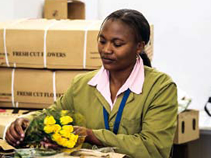 The share of the rejected stems in the Kenyan supply chain from farm to the market with the current packaging is roughly 20% on average. A more standardized box will help us save on this. However growers could not well agree on what should be the first step in piloting a new box. While most agreed that the cost of the box would be the main consideration, others felt processes and handling procedures in the supply chain should dictate the standard box. Floriculture Magazine spoke to some of the industry stakeholders. Below are the excerpts:
The share of the rejected stems in the Kenyan supply chain from farm to the market with the current packaging is roughly 20% on average. A more standardized box will help us save on this. However growers could not well agree on what should be the first step in piloting a new box. While most agreed that the cost of the box would be the main consideration, others felt processes and handling procedures in the supply chain should dictate the standard box. Floriculture Magazine spoke to some of the industry stakeholders. Below are the excerpts:
Statistics available reveal that Kenya is losing millions in Cool Chain Management (Pack house, refrigerated Lorries’ road transport, cargo handling at the airport and cargo plane of flowers). Most of these losses are occasioned by the type of boxes used in the cool chain management and how they are handled. This makes our flowers less competitive in the market. Carton manufacturers must invest a lot to provide solution for these losses in addition to ensuring that there is no compromise on quality as well as training growers on cool chain and carton handling.
